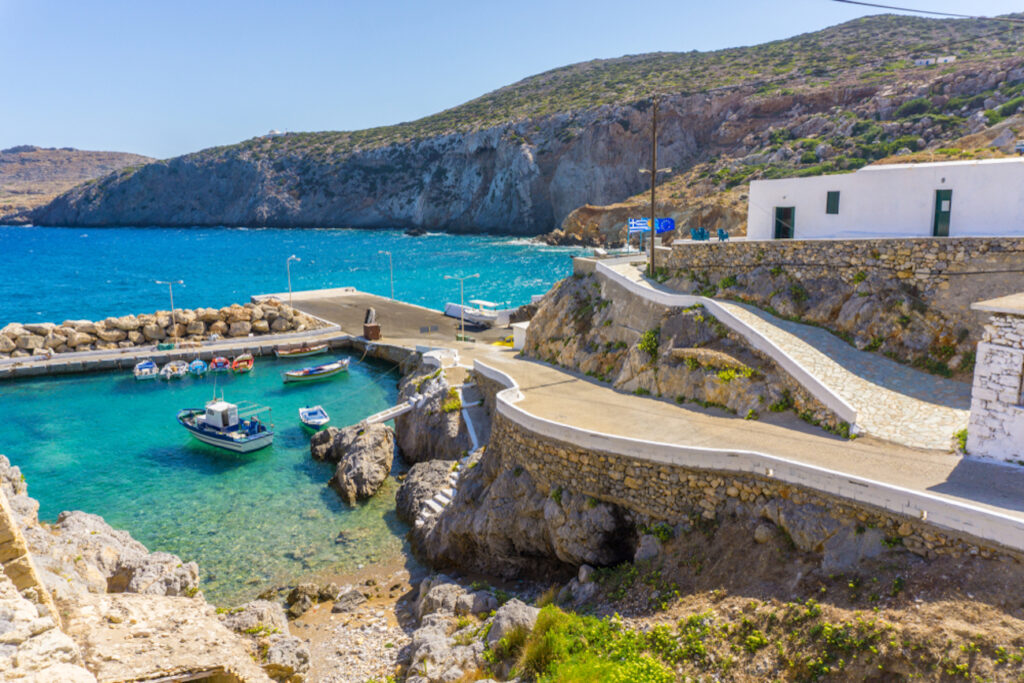Where Can I Get Paid to Move to Greece?
The Greek island of Antikythira (sometimes spelled Antikythera) wants to pay families to move there, with a few special requirements. The island of Antikythira is between Crete and Kythira in the Aegean Sea.
The Antikythera authorities plan to build homes and to open applications from families who want to live on the island. When the program is live, successful applicants will be offered a house and a plot of land in exchange for moving there.
Contact: + 30 273 603 3004

Are the Rumors True?
You might have read articles which suggest that you can be paid to move to a Greek island. We did our research to verify for you, interviewing local sources in Antikythera to learn more about this program. Elxis’s last conversation with local experts was in February, 2024.
So, are the rumors true? Can I really get paid to move Greece? If so, what island does this apply to? Can I move with my family? We’ll answer all the most frequently asked questions in this article.
Where Can I Apply to the Program?
Please direct any questions about applications to Kythira’s Tourism Department at 273 603 3004.
When Can I Apply?
Antikythira has NOT yet welcomed any families with this program because the homes are not yet complete. Therefore, it is NOT possible to apply yet. Please direct any questions to local authorities in Antikythera.
Who Can I Speak With About the Program?
Elxis – At Home in Greece does not manage any of the proposed projects in this program. Please direct any questions to Kythira’s Tourism Department.

Why Would Antikythira Pay People to Move?
Antikythira is one of the smallest islands in the Aegean Sea, with 24 full-time residents and 40 during the summer tourist season. Forty years ago, the island of Antikythira had 300 people, but the number has steadily reduced over the years.
The initiative was organized by the Greek Orthodox Church of Kythera (which extends to Antikythera as well). The goal is to attract bakers, fishermen, and of course, children. The program is designed for five families with four children who will be interviewed and then given a financial incentive to live in Antikythera.
The amount given is 500 euros per month for two years, as well as a house as long as they desire to stay on the island. These houses have not been built yet because of some delays in paperwork.

About Antikythira
The president of Antikythira, Andrea Harhalakis, said in an interview with Iefimerida.gr that “we need young families, large enough to make Antikythira alive and full of children’s voices.”
Another larger goal of the community is to boost the local economy and bring new life to the small Greek island community. The island of Antikythira doesn’t have any gas stations or taxis. It has a small coffee shop which serves as a gathering place for locals and also functions as a market for groceries.
Who Should Move to Antikythira?
You are a good candidate to move to Antikythira if you like the isolation of the sparsely populated Greek island. The island also has fantastic views and swimming spots, with pristine beaches. The most popular beaches are the “Xeropotamos” and “Kamarila,” which are not far from the main port.
Walk through the low hills among the greenery and explore the country chapels and caves. Antikythira is also known for its wild goats and a large breeding colony of falcons, also called “Eleonora’s falcon.”

History of Antikythira
Two incredible archaeological discoveries were found in the sea next to Antikythira from 340 BC and 80 BC: The “Youth of Antikythira” and the so-called “Antikythira device” – a machine for calendar calculations.
The first residents of the island of Antikythira were called the Dolopes. Next, the Romans used the island for prisoners, and afterwards as a haven for pirates. Today, Antikythira is a peaceful escape with cool artifacts and historic sites, like a shipwreck from the early 1900s and a fort that housed pirates. For more historic stires in Greece, see our feature on UNESCO sites in Greece.

How to Get to Antikythira
A ferry connects Antikythira to nearby Kythera island, and this is the quickest option, which leaves five times every week. The trip lasts two to three hours. You can also reach Antikythira from Kissamos in Crete and Pireaus in Athens, but these boats take longer and leave less frequently. If there are strong winds, the boat might not travel.

About Elxis
Elxis is a leading provider of real estate and legal services in Greece. With offices in Thessaloniki, Crete and Utrecht (Netherlands), we have more than 30 years of experience in managing the purchase and sale of homes, ranging from comfortable holiday houses in traditional Greek villages to luxury beachside villas and apartments. We provide new and existing houses that meet all budgets in Crete, the Peloponnese, Corfu, Lefkas and just about every place else you can think of in Greece.
Alongside a 7-person in-house team of lawyers, Elxis has a sales team that includes native English, Dutch, and German speakers to answer all enquiries in your language. Bricks and mortar are important but Elxis understands that trust and reliable legal advice are necessary components to laying the foundations of a dream home.
Ready to start your search for a home in Greece? Contact us here.








